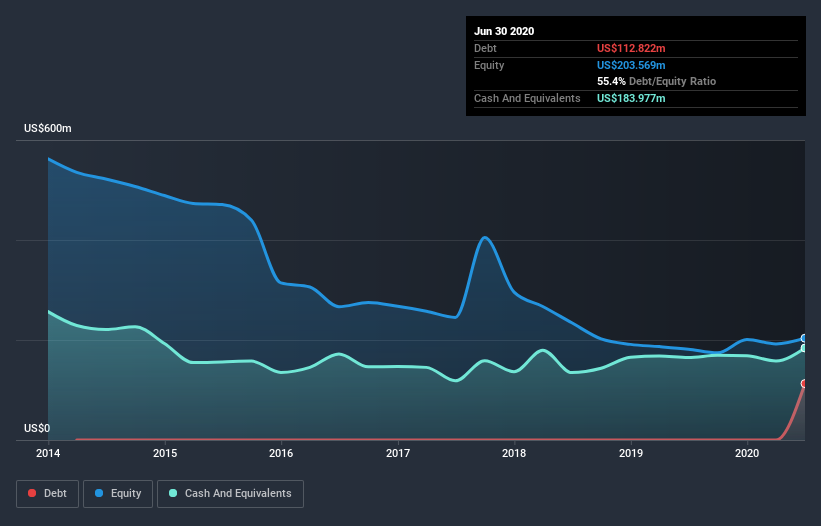Is Acacia Research (NASDAQ:ACTG) Using Debt In A Risky Way?

Warren Buffett famously said, 'Volatility is far from synonymous with risk.' So it might be obvious that you need to consider debt, when you think about how risky any given stock is, because too much debt can sink a company. Importantly, Acacia Research Corporation (NASDAQ:ACTG) does carry debt. But the more important question is: how much risk is that debt creating?
What Risk Does Debt Bring?
Debt and other liabilities become risky for a business when it cannot easily fulfill those obligations, either with free cash flow or by raising capital at an attractive price. If things get really bad, the lenders can take control of the business. However, a more common (but still painful) scenario is that it has to raise new equity capital at a low price, thus permanently diluting shareholders. Of course, plenty of companies use debt to fund growth, without any negative consequences. When we examine debt levels, we first consider both cash and debt levels, together.
Check out our latest analysis for Acacia Research
How Much Debt Does Acacia Research Carry?
As you can see below, at the end of June 2020, Acacia Research had US$112.8m of debt, up from none a year ago. Click the image for more detail. But it also has US$184.0m in cash to offset that, meaning it has US$71.2m net cash.
How Strong Is Acacia Research's Balance Sheet?
The latest balance sheet data shows that Acacia Research had liabilities of US$123.5m due within a year, and liabilities of US$67.1m falling due after that. Offsetting these obligations, it had cash of US$184.0m as well as receivables valued at US$1.39m due within 12 months. So its liabilities total US$5.21m more than the combination of its cash and short-term receivables.
Since publicly traded Acacia Research shares are worth a total of US$165.1m, it seems unlikely that this level of liabilities would be a major threat. But there are sufficient liabilities that we would certainly recommend shareholders continue to monitor the balance sheet, going forward. Despite its noteworthy liabilities, Acacia Research boasts net cash, so it's fair to say it does not have a heavy debt load! The balance sheet is clearly the area to focus on when you are analysing debt. But it is future earnings, more than anything, that will determine Acacia Research's ability to maintain a healthy balance sheet going forward. So if you're focused on the future you can check out this free report showing analyst profit forecasts.
In the last year Acacia Research had a loss before interest and tax, and actually shrunk its revenue by 88%, to US$8.3m. To be frank that doesn't bode well.
So How Risky Is Acacia Research?
By their very nature companies that are losing money are more risky than those with a long history of profitability. And we do note that Acacia Research had an earnings before interest and tax (EBIT) loss, over the last year. Indeed, in that time it burnt through US$21m of cash and made a loss of US$14m. But the saving grace is the US$71.2m on the balance sheet. That means it could keep spending at its current rate for more than two years. Overall, we'd say the stock is a bit risky, and we're usually very cautious until we see positive free cash flow. When analysing debt levels, the balance sheet is the obvious place to start. However, not all investment risk resides within the balance sheet - far from it. To that end, you should learn about the 3 warning signs we've spotted with Acacia Research (including 1 which is is a bit unpleasant) .
If, after all that, you're more interested in a fast growing company with a rock-solid balance sheet, then check out our list of net cash growth stocks without delay.
This article by Simply Wall St is general in nature. It does not constitute a recommendation to buy or sell any stock, and does not take account of your objectives, or your financial situation. We aim to bring you long-term focused analysis driven by fundamental data. Note that our analysis may not factor in the latest price-sensitive company announcements or qualitative material. Simply Wall St has no position in any stocks mentioned.
Have feedback on this article? Concerned about the content? Get in touch with us directly. Alternatively, email editorial-team@simplywallst.com.



